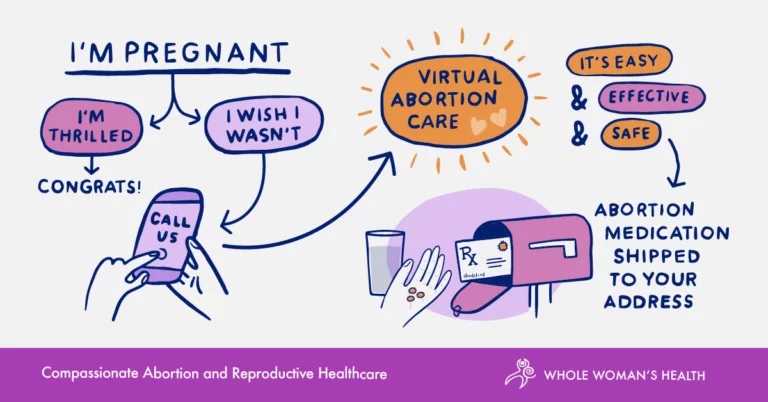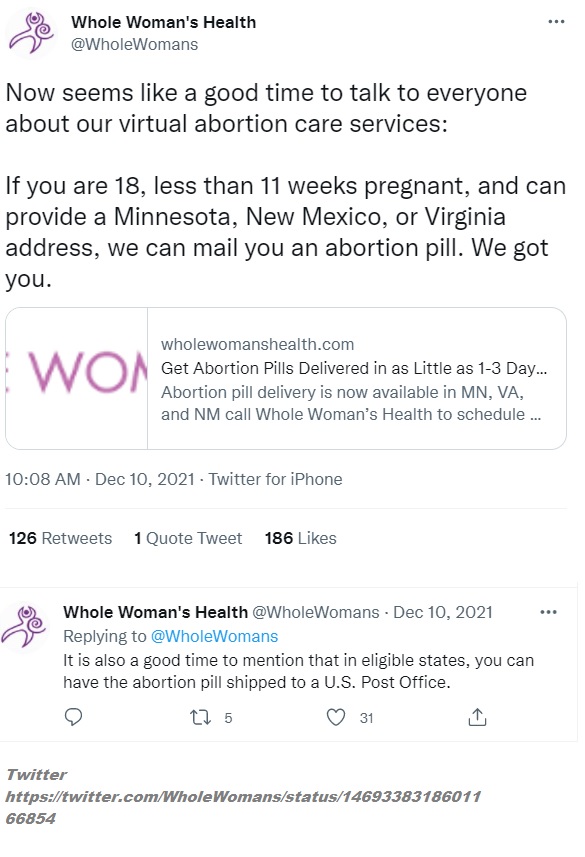Whole Woman’s Health (WWH), an abortion chain with a history of failed health inspections putting women in potential danger, is jumping into the lucrative mail order abortion pill business, telling media that the chain has plans to open an abortion pill Telehealth center in New Mexico. The Texas-based abortion chain, which recently tweeted that “abortion is good,” was founded in 2003 by Amy Hagstrom Miller, and has had a series of documented health and safety code violations at multiple WWH locations — including failing to follow up on clients after chemical abortion.

Whole Woman’s Health Mail order abortion pill (Image: WWH website)
Whole Woman’s Health history of deficiencies
A list of WWH’s deficiencies, taken directly from a court document filed on behalf of multiple states and submitted by 11 Attorneys General, can be read below:
- WWH Austin (Texas): “[F]ined $22,980 in 2011 by the Texas Commission on Environmental Quality for improper disposal of medical waste and fetal remains…. In 2017… failed to ensure that medical instruments were being sterilized properly… failed to properly account for narcotics and failed to give patients the name and telephone number of the nearest hospital to them, as required by state law…. [I]n 2018… again failed to properly account for narcotics and failed to give patients the name and phone number of the nearest hospital….” In 2017… “failed to schedule follow-up appointments with patients receiving chemical abortions.”
- WWH San Antonio (Texas): “[I]nspectors noted several deficiencies during its annual inspection on October 16, 2018. In addition to yet other deficiencies regarding the tracking of narcotics and failing to give women the name and address of the hospital closest to her home in case of emergency, the report notes the facility ‘failed [to] ensu[r]e that policies on decontamination, disinfection, and sterilization, and storage of sterile supplies were implemented.’ […]Like the reports for the Austin and Beaumont clinics, the report notes that WWH San Antonio failed to comply with FDA protocol and state law regarding chemical abortions by failing to schedule required follow-up appointments.”
- WWH McAllen (Texas): “A November 2015 inspection report notes that the facility ‘failed to enforce written policies governing the facility’s total operation, to provide health care in a safe and professionally acceptable environment[,]’ and ‘failed to have a safe and sanitary environment[.]’ […] The reports notes products of conception were stored in unlabeled Ziploc bags in a freezer instead of in biohazard bags. Inspectors noted the vinyl cover on an exam table was torn, ‘which can harbor bacteria and prevent the exam table from being completely cleaned.’ […] In 2016, a report again notes that the facility failed to maintain a ‘clean and sanitary environment’ because a laminate countertop in the pathology room, which was also used to clean and pack surgical instruments, was ‘warped and bowed away from the particle board’ beneath… The countertop ‘was no longer a wipeable surface which could harbor bacteria and infectious matter.’ In 2017…the clinic failed to give patients the name and phone number of the nearest hospital emergency room to their home.”
- WWH Peoria (Illinois): “A January 2017 inspection report indicated that the facility ‘failed to ensure medical equipment is inspected and maintained to ensure safety. This has the potential to affect all patients receiving care from [the facility].’ […] The report notes the facility failed to properly store medication… A March 2018 inspection report included multiple deficiencies which had ‘the potential to affect all patients serviced by the facility.’ […] According to the report, the clinic failed to ensure that all three of the clinic’s physicians were properly credentialed, and failed to ensure that a registered nurse was on duty when patients were present. It also failed to maintain the required AED in working order, despite it being on the emergency crash cart. The report states that the facility also ‘failed to ensure patient care equipment was appropriately sterilized prior to patient use[,]’ and ‘failed to ensure its policy on multidose vials [of medication] was followed to prevent the potential for cross[]contamination.’ The report further notes that ‘the Facility failed to ensure IV conscious sedation was administered and/or supervised only by’ appropriately credentialed physicians.”
The court document also details gross violations at WWH’s now closed Beaumont location, previously highlighted at Live Action News. In 2019, WWH announced the closure of the Peoria clinic as well as its San Antonio facility.
Whole Woman’s Health sets up Telehealth abortion in New Mexico
Earlier this month, WWH told Reuters that the abortion chain had opened a Telehealth facility in New Mexico “to serve women seeking medication abortions past six weeks.” But, as of the writing of this report, a glimpse at WWH’s website as well as its umbrella organization, Whole Woman’s Health Alliance (WWHA), shows there have been no facility locations in that state after the Las Cruces facility was closed in 2017.
Yet, in a recent interview with Ms. Magazine, abortionist Alison Case admitted to providing “in-clinic and telemedicine medication abortions to patients in New Mexico” for WWH. And two months prior to the Food and Drug Administration’s decision to weaken important safety regulations on the abortion drug mifepristone and permanently allow abortion pills to be shipped by mail, WWH announced on Twitter that it was already shipping pills by mail in Minnesota, Virginia, and New Mexico.
Case, who also claimed she “worked on the EACH Woman Act, to end the Hyde Amendment and restore insurance coverage for abortion,” told Ms. Magazine that she delivers babies, is an Indiana family medicine doctor, and in addition to her work with WWH also works for Planned Parenthood in Indiana.
“What happens is patients go to New Mexico, and as long as they’re in New Mexico, I can treat them with my New Mexico license,” Case said. Clients at WWH initially meet with a “care coordinator” before speaking with Case directly. “I go over the risks again. Even though they’re very, very small, we want people to know what to look for. I then briefly go over how to take the medicine and review whether they would like any birth control again,” Case told Ms. Magazine.
Case claimed she is the “only provider offering telemedicine abortion in New Mexico,” however, the pro-abortion MYA Network lists the Las Cruces based Full Circle Health Center as also offering the abortion pill by mail. In addition, MYA Network’s Facebook page lists long-time abortion provider Linda Prine as a New Mexico “clinician.” They describe her as a “professor of Family and Community Medicine at Mount Sinai School of Medicine in NYC” and “a co-founder of the Reproductive Health Access Project.” Prine also teaches early abortion techniques to family medicine residents at various locations in New York City, including Planned Parenthood. Prine recently suggested that even if a clinician has “signed lease agreements that abortions will not be performed on the premises of the respective clinic site” mail order abortions may be offered because “most lawyers agree that medication abortions are not performed on the premises of health centers.”
Whole Woman’s Health instructs clients to flout state laws
Like others in the abortion industry advising clients on how to flout state laws that prohibit the abortion drug regimen to be shipped by mail, WWH is no different. A Twitter thread published in December tells potential clients residing in states like Texas which have strict laws on abortion that, “It is also a good time to mention that in eligible states, you can have the abortion pill shipped to a U.S. Post Office.”

Whole Woman’s Health Tweet suggests shipping abortion pills to US Post Office (Image: Twitter)
Case confirmed this to Ms. Magazine. “We’ve had people use hotel addresses, and we’ve had people use family addresses. They can also use General Delivery to a New Mexico post office. Some people stay at hotels until their medications arrive,” Case said.
Virtual abortion enables abortion facilities like WWH greater profits by eliminating facilities and staff and drastically reducing the time spent with clients. WWH and others mark up the cost of the abortion pill regimen (which can be purchased for under $100) by charging clients four to five times more. And as WWH, its abortionists, and others market self-managed abortions as safe, multiple studies have documented the potential serious complications that can arise from women using the abortion pill, including incomplete abortions, hemorrhage, serious infections, hospitalization and even death.
“Like” Live Action News on Facebook for more pro-life news and commentary!







